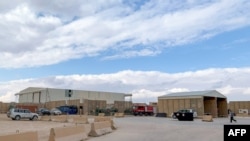This week’s rocket attack on a major air base in western Iraq appears to have done little damage, according to the latest assessment by U.S. military officials.
Assailants launched a series of rockets at the Al Asad air base in Iraq’s Anbar province early Wednesday, causing personnel at the base to take cover. But U.S. officials now say a defensive system installed at the base helped prevent at least four of the rockets from hitting their intended targets.
“We assess that C-RAM [Counter Rocket, Artillery, Mortar] effectively engaged four of the 10 rockets that impacted the base,” Pentagon Spokesperson Commander Jessica McNulty told VOA late Thursday.
“None of the rockets made direct hits on any structure or vehicle,” she added. “There was some minor shrapnel damage that will not have any impact on operations.”
One U.S. civilian contractor died during the attack, though defense officials have previously said the death was the result of a heart attack suffered while rushing to take shelter.
U.S. officials have said they are investigating the attack, though Iraqi security forces are in the lead. They also warned the U.S. will take action to retaliate if they determine a response is warranted.
“I think we have shown clearly that that we won't shy away from that,” Pentagon press secretary John Kirby told reporters Wednesday. “But we’re just not there yet.”
Wednesday’s incident at Al Asad is the latest in a series of rocket attacks by Iran-backed militias on bases in Iraq that house both U.S. and coalition forces. It also comes less than a week after U.S. President Joe Biden ordered an airstrike against a compound in eastern Syria, which U.S. officials said had been used by the militias to facilitate those attacks.
At the time, Biden said the strike was meant as a warning to Iran that it “can't act with impunity.”
The U.S. has blamed some of the previous rocket attacks on two Iran-backed militias —Kataib Hezbollah (KH) and Kataib Sayyid al-Shuhada (KSS). Officials said last week’s strike was designed to make it more difficult for either group to carry out additional attacks.
“Certainly, this is a troubling development and not what anybody wanted to see,” Kirby said Wednesday.
“Nobody wants to see the situation escalate,” he added. “Just like before, we're going to act appropriately to defend our personnel, our interests and those of our Iraqi partners.”
Other officials cautioned Washington’s next move would be measured.
"If we assess a further response is warranted, we will take action again in a manner and time of our choosing," White House press secretary Jen Psaki told reporters. "What we won't do is make a hasty or ill-informed decision that further escalates (the situation) or plays into the hands of our adversaries."
Despite the U.S. rhetoric, one of the militias blamed for previous rocket attacks celebrated the attack on Al Asad.
“We congratulate the Iraqi resistance for the heroic operation on the base of evil in Ayn al-Assad,” Abu Ali al-Aksari, a security official for Kataib Hezbollah, said in a statement issued Wednesday, translated by the SITE Intelligence Group.
“We advise our sons to continue this approach to expel the killers and scum from our sanctified land,” he added, though he did not claim responsibility for the attack.
Al Asad air base has been attacked before. Iran itself targeted the base last year in a retaliatory strike for the U.S. killing of top Iranian commander Qassem Soleimani.
Ahmad Zebari and Dilshad Anwar from VOA's Kurdish Service contributed to this report.








